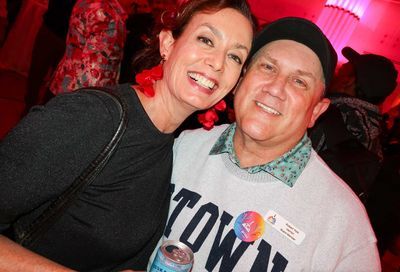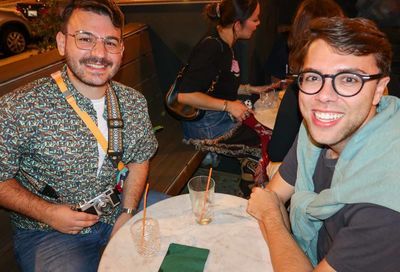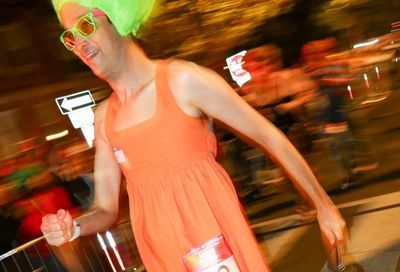National survey reveals LGBTQ youth face high levels of stress and fear in their daily lives
85% of LGBTQ-identifying teens say they'd rate their stress level as a 5 or higher on a scale of 1-10

LGBTQ-identifying youth face high levels of stress, depression, and fear due to the challenges they face in their daily lives, according to a first-of-its-kind survey of LGBTQ teens from across the nation.
The 2017 LGBTQ Teen Survey, conducted online by the Human Rights Campaign and the University of Connecticut, surveyed more than 12,000 youth aged 13 to 17, asking them a variety of questions about the challenges they face, the level of acceptance they experience in their daily lives, their fears, any sexual violence they face, their level of stress, and how “out” they are to their peers and the adults in their lives, including parents, family members, teachers, or counselors.
HRC held a press briefing at its D.C. headquarters on Tuesday morning unveiling the results of the survey. The press briefing featured comments from HRC employees, activists, Princess Moss, the Secretary-Treasurer of the National Education Association, and Keisha and Sean Michaels, parents of a transgender teen and members of HRC’s Parents for Transgender Equality Council.
“What we intended to do with this survey is to capture a sense of what LGBTQ youth are experiencing, not just in school, but in their own minds, their own sort of sense who they are, in their families, their neighborhoods, their communities, what kind of messages they’re getting from people around them…” Ellen Kahn, the HRC Foundation’s Director of Children Youth and Families Programs, told Metro Weekly. “It really tries to bring to life a fuller picture for what youth are experiencing over the course of a day.”
Overall, the survey found that LGBTQ-identifying teens are experiencing high levels of stress, anxiety, and rejection. Only 26% report feeling safe in school, and only 5% say they’d classify their teachers and administrators as LGBTQ-supportive. At home, 67% of LGBTQ-identifying youth say that they’ve heard family members make negative comments about LGBTQ people.
Some of the survey’s more alarming findings include the fact that a mind-blowing 77% of LGBTQ teens report they’ve felt depressed over the past week, and 95% report they have trouble sleeping at night. Eighty-five percent of all LGBTQ youth say they would rate their average stress level as “5” or higher on a scale of 1-10, and that number climbs into the 90s for transgender boys, non-binary, and gender-nonconforming children.
Other findings reveal that LGBTQ youth of color and transgender youth face additional challenges and a heightened level of stress around their identity and their daily interactions. For example, only 11% of youth of color believe their racial or ethnic group is regarded positively in the United States, and 50% of transgender or gender-nonconforming youth said they are prohibited from using restrooms that match their gender identity or expression.
Kahn says the survey makes it clear that supportive families and inclusive schools are essential to reducing youths’ feelings of stress, anxiety, depression, or isolation.
“Most of what’s weighing [youth] down is the poor treatment they get from adults, and that’s something that can be solved,” Kahn said.
The survey also reveals some positive findings, including that 91% of LGBTQ-identifying youth report feeling proud of their identity, and 93% are proud to belong to the LGBTQ community. Additionally, nearly 60% of students report having access to an LGBTQ student club at school. The presence of a supportive club has been shown to have a positive impact on youth’s perception of their school experience, and can help provide support to students who do not have a supportive environment in their homes or in other spheres of their lives.
Dr. Ryan Watson, an assistant professor at the University of Connecticut said the survey highlights an urgency to address the disparities that LGBTQ teens face. He hopes that the study’s findings will help inform policy to address those problems, and can serve as a jumping off point for further in-depth study.
Chad Griffin, the president of the Human Rights Campaign, said that the more troubling results of the survey cannot be viewed in a vacuum, and are tied to the national political climate and the status of LGBTQ people within the larger society.
“The simple truth is that when Donald Trump, Mike Pence, and Betsy DeVos attack transgender students by rescinding guidance that was established for the sole purpose of protecting them, or when lawmakers attempt to grant a license to discriminate to schools, colleges and universities, all of this further erodes the fragile landscape for young people across this nation,” Griffin said.
“When elected leaders attack LGBTQ people, it gives license to others to do the same, and it serves to fan the flames of hate and bigotry.”
Addison Moore, an 18-year-old trans activist from Washington, D.C., told those in attendance at the briefing that he could empathize with some of the sentiments expressed by LGBTQ youth in the survey.
“I feel like most people in my life tolerate me, but I don’t feel they accept my identity and experience,” Moore said. “For example, most of my friends and family do not use my preferred pronouns, or the name I have chosen for myself. … At school, I am out as trans. Yet I still constantly hear either transphobic or homophobic comments by people who call me their friend, or family, even. Even when it comes to bathrooms, as a trans youth…I am constantly told I am in the wrong bathroom by staff an students alike.
“I want all LGBTQ people to feel safe in their schools, and supported. We deserve that. I deserve that,” Moore said. “I hope that by hearing these stories, not just from me, but from other youth, they understand that this is a very real thing, that I’m real, that this isn’t a far-off concept that they just hear about on TV or on social media, but that I exist in school with them. I hope that by reading the HRC report, people really understand the struggles, and the hope, that LGBTQ youth face today.”
Support Metro Weekly’s Journalism
These are challenging times for news organizations. And yet it’s crucial we stay active and provide vital resources and information to both our local readers and the world. So won’t you please take a moment and consider supporting Metro Weekly with a membership? For as little as $5 a month, you can help ensure Metro Weekly magazine and MetroWeekly.com remain free, viable resources as we provide the best, most diverse, culturally-resonant LGBTQ coverage in both the D.C. region and around the world. Memberships come with exclusive perks and discounts, your own personal digital delivery of each week’s magazine (and an archive), access to our Member's Lounge when it launches this fall, and exclusive members-only items like Metro Weekly Membership Mugs and Tote Bags! Check out all our membership levels here and please join us today!























You must be logged in to post a comment.